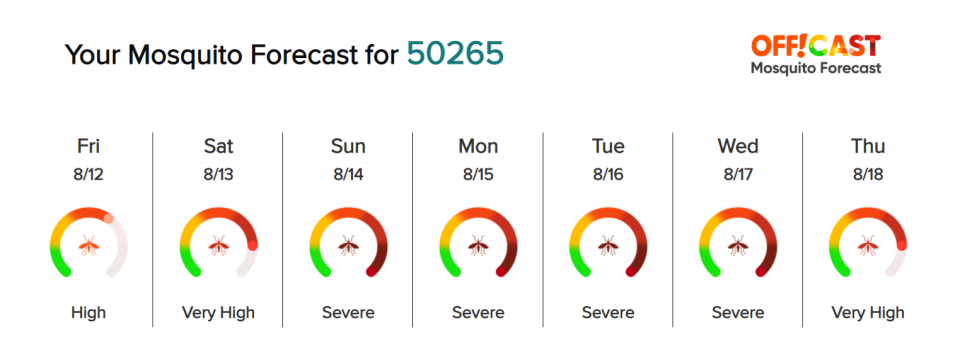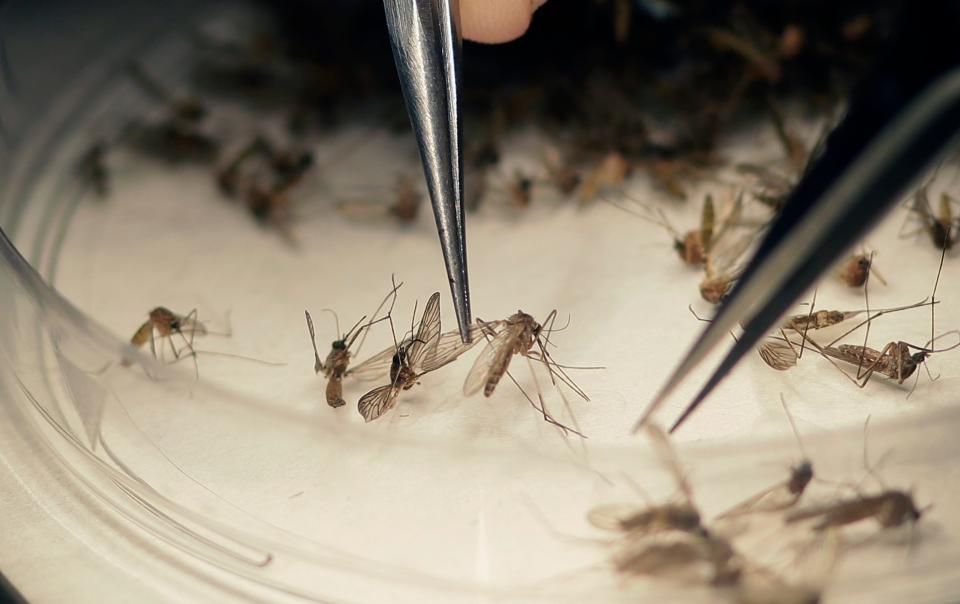Break out the bug spray. Mosquito forecast warns of increased population in central Iowa.
OFF!Cast, OFF!’s mosquito forecasting tool, says central Iowa's mosquito population is growing.
The OFF!Cast map, which predicts local mosquito populations up to seven days in advance, forecasts a high to very high mosquito population Friday and Saturday, which will become severe Sunday and last through the rest of the week.
The influx of mosquitos in the state comes just a week before World Mosquito Day on Aug. 20, a day that recognizes the 1897 discovery that Anopheles mosquitoes transmit the malaria parasite to humans; this year marks the 125th anniversary.
Dr. Ryan Smith, an associate professor in the Department of Entomology at Iowa State University, previously told the Des Moines Register that higher mosquito populations were predicted this year based on warmer temperatures and increased rainfall.
Smith oversees the university's mosquito surveillance program, Smith Laboratory, which monitors mosquito populations and mosquito-borne diseases in Iowa.

More: Des Moines' mosquito population could spike soon. How can you protect yourself from bug bites?
The department doesn't forecast mosquito populations but partners with agencies, such as the Iowa Department of Public Health and the University of Iowa's State Hygienic Lab, to analyze real-time trends. The university's data this year already showed a swell in mosquito populations at the beginning of June, before dipping again, Smith told the Register.
Despite early predictions of an above-average summer for mosquitos, drought conditions in the state have kept the mosquito population down since June, he said.
"What I can say is we're not seeing a lot of mosquitoes right now," Smith said. "I would probably say it's a little bit less than normal."
According to Smith, the lab's recent observations do not support OFF!'s prediction that there will be a swell in the mosquito population next week.
"At least some of our primary nuisance mosquitoes, they really haven't been around in very high numbers at all over the last couple of weeks, so I don't think there's a huge risk per se of it being 'severe,'" Smith said. "I'm not going to say that there's not mosquitoes out there. And there is, as we move later into the summer, an increased risk for West Nile Virus in your mosquito population. But I think pretty comfortably, you can not worry about a big swarm of mosquitoes."
Despite August holding World Mosquito Day, Smith says the mosquito population typically hits a low point during this month.
"This period of August is usually kind of the lowest of the summer," Smith said. "I would say historically, we see typically a lot of mosquitoes early in May and June. And then we tend to see an increase later, once you get into September. But right now, it's been really dry, and there just isn't a lot of activity that we're seeing right now."
Mosquito populations in Iowa, he said, vary year over year, but typically spike from May to October. Iowa has about 57 mosquito species, according to Smith. The lab chooses a handful of counties across the state each year to observe mosquito populations.
In 2022, the lab observed and collected samples of more than 67,000 mosquitos from seven counties: Polk, Story, O'Brien, Page, Woodburn, Blackhawk and Johnson, according to this year's mosquito surveillance data from the university.
The vast majority of those observed — 60,081 — were in Polk County, the university's surveillance data shows. And about 95% of mosquitos observed throughout the surveillance locations were aedes vexans, a common mosquito that does not carry diseases.
The lab keeps a close eye on the Culex species of mosquitoes, which like to feed on birds including blue jays and crows; the mosquitoes often carry the virus, then bite humans, infecting them.

Although mosquitoes tend to be more numerous earlier in the summer, the types most likely to carry the West Nile Virus tend to come out in late summer and early fall, as previously reported by the Des Moines Register.
"So even if there's not a huge number of mosquitoes right now, this is still the time of the year that West Nile Virus is typically kind of ramping up," Smith said. "As we get into late August and early September, that's usually when the bulk of our West Nile Virus transmission occurs."
More: Go away! Here's how to stop mosquitoes from biting you this summer
The virus, which can cause dangerous fevers and brain swelling, arrived in Iowa in 2001 and peaked here in 2003, when it caused 147 confirmed illnesses and killed six Iowans. The next peak was in 2018 when the virus seriously sickened 73 Iowans and killed three. Cases in the state have been in the single digits in the years since.
"West Nile Virus is transmitted by Culex mosquitoes and these are most active in the evening, dusk time period, so if you're going to be outside during those times I would definitely try to wear some repellent," Smith said. "Most of the time, people who are infected with West Nile Virus, it's going to be dismissed. But really, in fact, it does require hospitalization and can cause death. It is a pretty serious virus that I wouldn't wish on people."
Iowans should follow precautions and empty any standing water near their homes to prevent a breeding ground for mosquitos that could potentially carry the virus, according to Smith.
Protect yourself from mosquito bites
The Iowa Department of Public Health gives these tips for Iowans to protect themselves from insect bites:
Use insect repellent with DEET, Picaridin, oil of lemon eucalyptus, or IR3535. Always read the repellent label and consult with a health care provider if you have questions when using these types of products for children. For example, oil of lemon eucalyptus should not be used on children younger than 3 and DEET should not be used on babies younger than 2 months.
Avoid outdoor activities at dusk and dawn when mosquitoes are most active.
Wear long-sleeved shirts, pants, shoes and socks outdoors.
Eliminate standing water around your property, because that's where mosquitoes lay eggs. Empty water from buckets, cans, pool covers and pet water dishes. Change water in bird baths every three to four days.
The city of Des Moines contracts with Clarke, a mosquito control company based in Illinois, to manage the insects. Services include standing water inspections and testing, and larval and adult control, according to the city's website.
Des Moines residents can call the Mosquito Hotline using the Clarke customer portal or at 800-942-2555 to report standing water issues, request neighborhood spraying or be added to the spray "shut-off" list. For more information, go to dsm.city/departments/neighborhood_services/mosquito_control.php
Residents with questions about the city’s mosquito control program or product information, can call Chris Heilskov at 515-237-1486 or Vince Travis at 515-283-4077 between 7:30 a.m. and 4:00 p.m., Monday through Friday.
Grace Altenhofen is a news reporter for the Des Moines Register. She can be reached at galtenhofen@registermedia.com or on Twitter @gracealtenhofen.
This article originally appeared on Des Moines Register: Mosquito population expected to be very high to severe in Iowa soon

